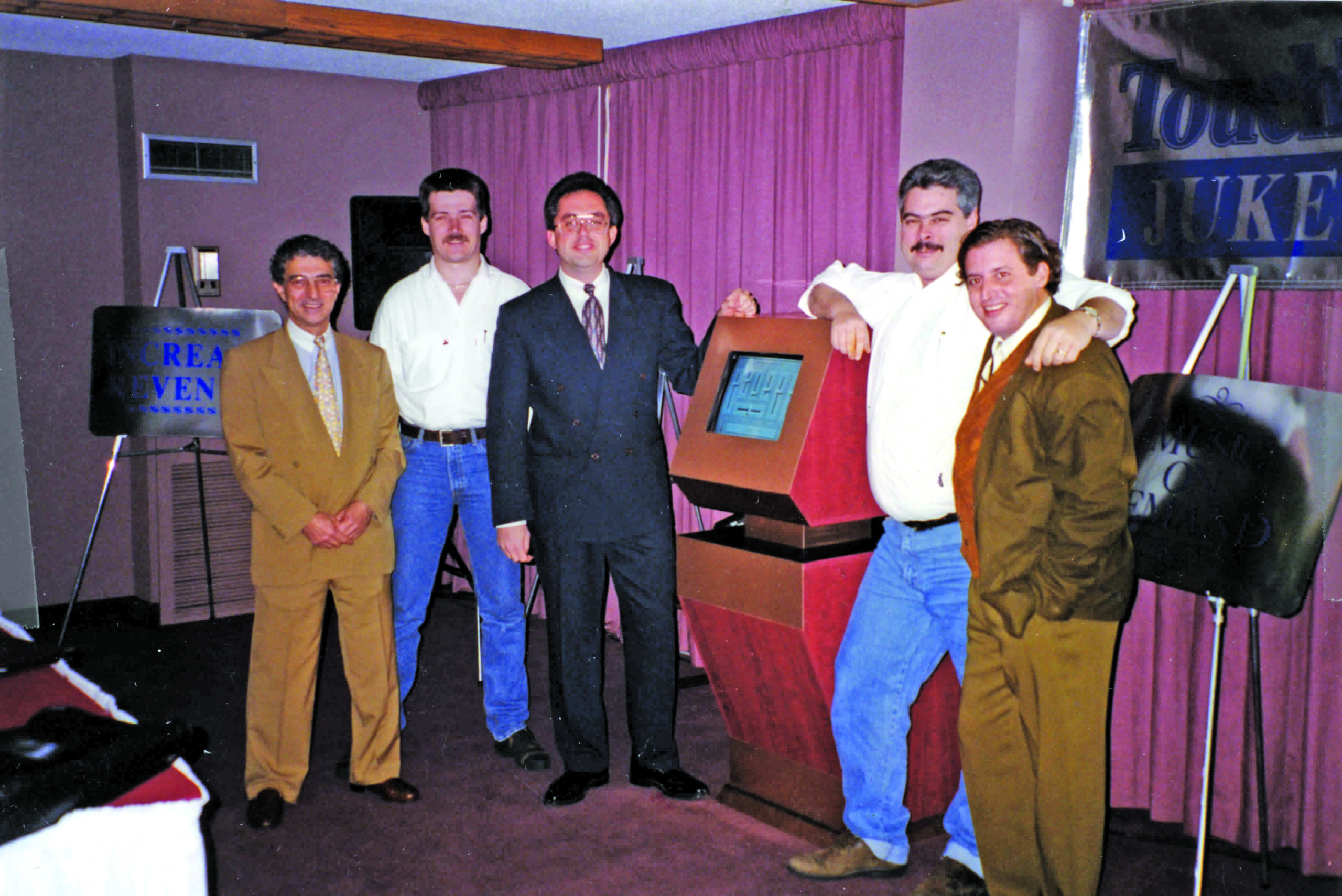
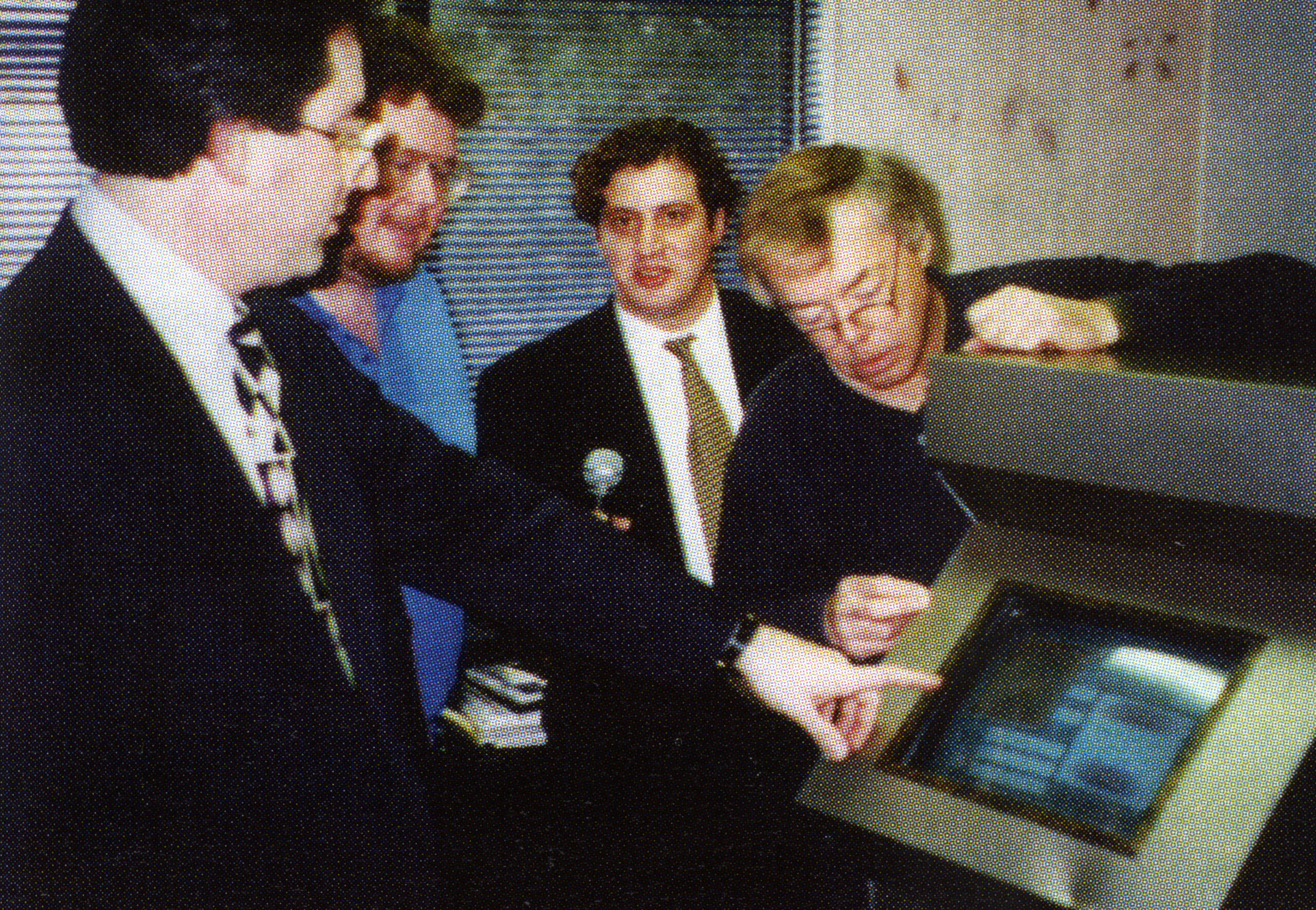
Celebrating 25 Years of TouchTunes
And the Digital Jukebox Revolution
Groundbreaking. Revolutionary. Game-changing. When it comes to TouchTunes Music Company and its contributions to today’s jukebox business, this isn’t hyperbole. The now-25-year-old company really did change the face of business and how “coin-operated” music is delivered, taking the music machine from the compact disc era into the world of digital downloading music with app-based play and remote, app-driven management for operators.
Even before Apple unveiled its first iPod, Canadians Tony Mastronardi and Guy Nathan were promoting a digital jukebox complete with a touchscreen selection panel instead of title strips and buttons, showing it in a hospitality suite during the 1995 AMOA Expo. Mastronardi even carted a version of the revolutionary concept to RePlay’s Southern California offices early the following year.
Of course, many technological and business hurdles had to be jumped, including striking per-play licensing deals for music, getting operators on board with a revenue-share arrangement, hard disk storage, modem connections and so on. Other companies also entered the market with their versions of the new tech, and as the years passed, the North American market came to be dominated by just two major players.
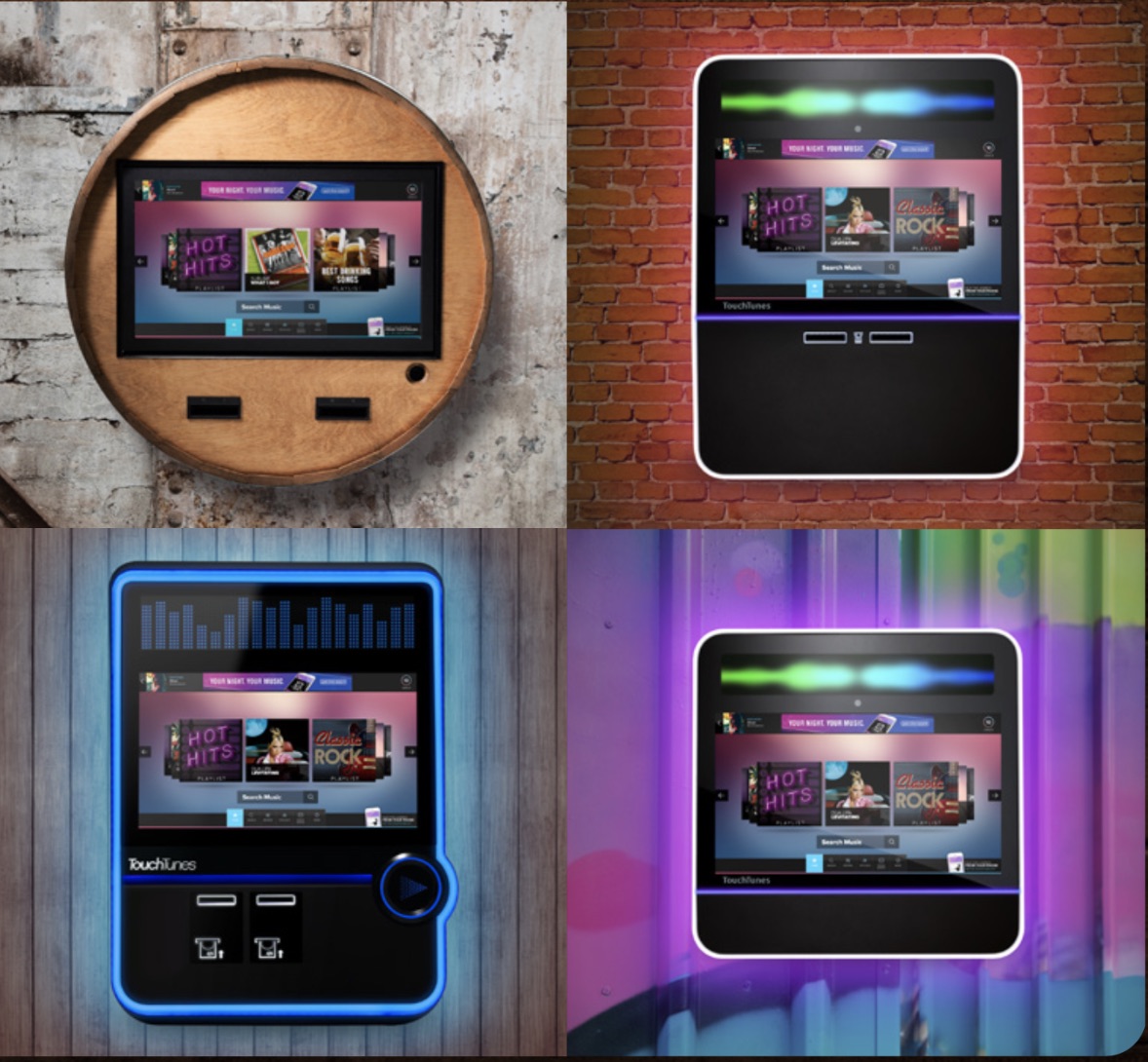
Today’s TouchTunes boxes, run by over 2,500 operators and offering hundreds of thousands of songs, are fully featured with advertising and other enhancements to increase the value of the jukebox to the location, consumer features like FastPass that lets them pay extra to bump their selection to the top of the “playing next” list, and Tempo, a robust backend for operators.
On its anniversary, RePlay interviewed Ross Honey, who was appointed CEO and president in 2017 (he joined in 2016 as COO/president), about the milestone and TouchTunes’ journey.
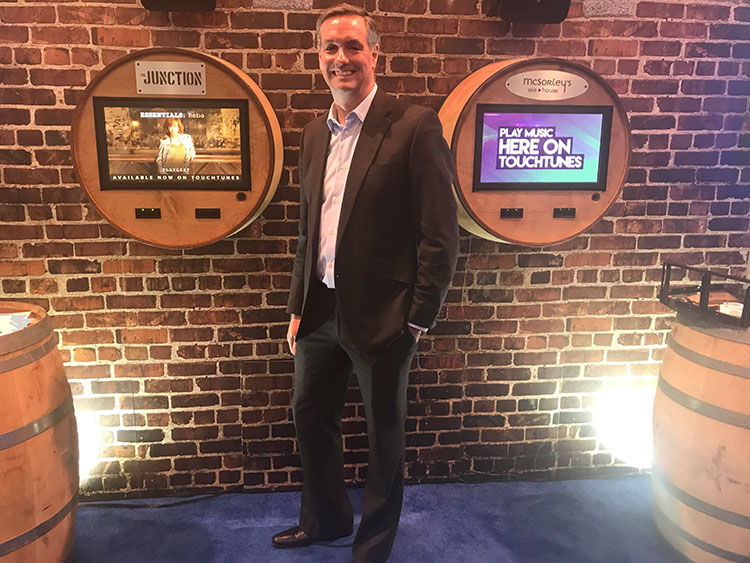
Today, using a mobile app to pick a song on a digital jukebox with virtually endless music content is so common that many people – even in the industry – have forgotten that it wasn’t always so.
It truly is amazing. TouchTunes was founded in 1998 by Tony Mastronardi and Guy Nathan, and hats off to them – they were visionaries. They saw the opportunity to use technology to dramatically improve the jukebox experience for everyone –for consumers and operators.
In those days, the jukebox was generally CD-driven but maintaining the library was a lot of work. New music was coming out all the time and operators had to constantly buy new CDs and update their jukeboxes. Our founders saw that they could dramatically expand the available music and reduce the amount of work operators had to do to maintain their routes.
The first jukebox they launched initially only had a library of 750 songs versus the hundreds of thousands we have today. But to their credit, they saw an opportunity with technology to improve the experience for everyone and transform what it means to be a “jukebox.” We’ve worked hard to continually innovate around the products with new jukeboxes, bigger screens, better user experiences and, obviously, mobile. Today, digital boxes are mobile-first and the vast majority of our usage and revenue is now driven by the mobile app.
What were the key obstacles the founders faced?
The fundamental challenge was that this had never been done before. Music in a digital format – of any type – was still in its nascent stage. 25 years ago, there just wasn’t a large amount of music available in a digital format. We had to work with the music industry over time to educate them about the opportunity of digital boxes and also wait for them to clear their music. It was a joint effort over many years, and today, essentially all music is digitized and can be made available on the jukebox. Labels and licensors have been great partners. They see the value of the jukebox and have really supported our business over time.
This switch to digital music also necessitated the creation of a whole new method of licensing and tracking the number of plays for each song.
Right, it was very different from CD jukeboxes where you bought the disc, put it in the jukeox and that was it. We report back to every licensor and pay each one based on their usage. We’ve invested a lot of time and effort over the years to build that infrastructure to ensure that we’re appropriately rewarding all artists and licensors for their music.
I can only speak to the last seven years – but over a 25-year arc, it was both exciting and interesting for operators because more music was available and they didn’t have to do the work to maintain the library. More music and less work – that’s super attractive.
Another of the founders’ innovations was to change the model for the jukebox itself. Operators used to buy the machine and that was that. We moved to a model where the operator makes the hardware purchase at cost and we share the revenue as it’s spent over time. That was a big change but I think overall, operators saw that it was a good change – the right change. Today, digital boxes are the jukebox industry and there are very, very few CD boxes or anything else remaining because it ultimately was a good business and product for all involved.
An ecosystem like the digital jukebox with TouchTunes, operators, venues and consumers has to work for everybody or it falls apart. We keep that front of mind, making sure we create a great product that consumers are going to want to use, one that venues feel good about having in a location and is a good business for the operators. We’ve grown revenues significantly over time, and speaking of the seven years I’ve been here, we’ve done that and also lowered the costs of managing our business. It is a better business for operators, locations and us, too.
Was TouchTunes first to market with a mobile app to drive jukebox play?
Yes, in 2010. I wasn’t around for that, but they said we were crazy. The breakthrough ideas have generally never been done before and therefore, people can be somewhat skeptical that they will work. But, we launched the app and then worked hard over the last 13 years to continually improve it. Today, the app brings in the vast majority of the business, which is really exciting. It’s grown the revenue and maintained our relevance to a whole new generation of users. Because it’s cashless, the app has also made operators’ lives easier because now they don’t have to collect as often.
During Covid shutdowns, the app’s touchless nature and, in some cases, the use of outdoor speakers, enabled operators to earn money.
It was certainly a very challenging time, particularly for customers in California, New York and New Jersey, to name just a few states with strong restrictions and closed locations. For states that did reopen in late 2020 and 2021, the jukebox was an important lifeline of revenue. It was also the primary source of entertainment given the lack of sporting events and live music.
The mobile app was perfectly made so people didn’t have to touch the box, which they were concerned about. So, it was a challenging time but I’m proud of how the team worked hard to continue to support the industry and the operator community.
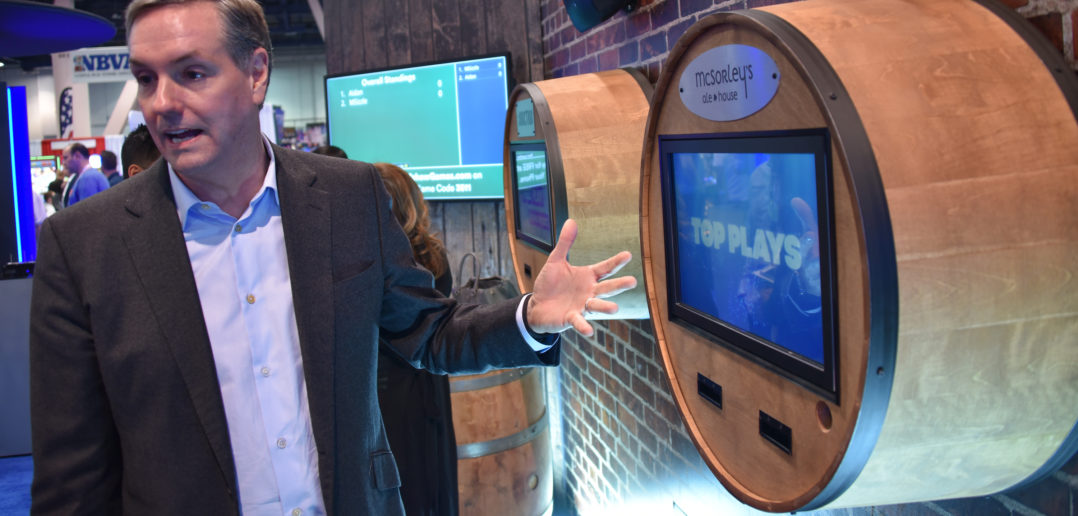
The Fusion jukebox, the most recent hardware introduction, allows operators to customize the unit’s look on location. How did that come about?
Fusion was inspired by locations we knew would like a jukebox for the experience it provides for patrons and the revenue it generated, but felt that the visual of a Virtuo or Angelina wasn’t ideal for their venue. The engineering team did great work, thinking, “What if we took the internals of the Angelina, configured it into a different chassis and then made it such that the façade of jukebox could change and could be whatever the location and operator wanted. As we thought about that, we had the half-barrel design in mind.
Giving credit where credit’s due, the operators at E2 (Entertainment Expert’s Jason Rubin and Matt Pascal) were the first to test that concept. They put a jukebox in a barrel and had some success, told us about it and we agreed that that it was an interesting opportunity.
We “productized” the idea and created the chassis of the Fusion with the barrel as the default option. Other operators have done their own thing with Fusion. I’ve seen it put inside an old gas pump, built into the wall and so on, but the vast majority are in the barrel, going into locations like brewpubs, alehouses, wine bars and whiskey bars. At its core, it was all about how we get more locations for jukeboxes by adjusting the visual experience of the hardware to facilitate that.
Please update readers on the Angelina jukebox, named after operator Lou Miele’s daughter, who lost her battle with cancer, and the Angelina’s Song foundation they started in her honor.
It’s been going great. Naming the jukebox Angelina and tying it to the Angelina’s Song charity speaks to how important and how much we value the relationship between TouchTunes and operators. I’m proud to say that since we launched Angelina, and as we said we would, we have contributed to Angelina’s Song for every sale. To date, $300,000 has been donated to that foundation.
We have also worked with operators to donate boxes to a number of children’s hospitals across the country. We donate the hardware and don’t charge for the music so it’s free to be used in music therapy for patients and enjoyed by the staff and families.
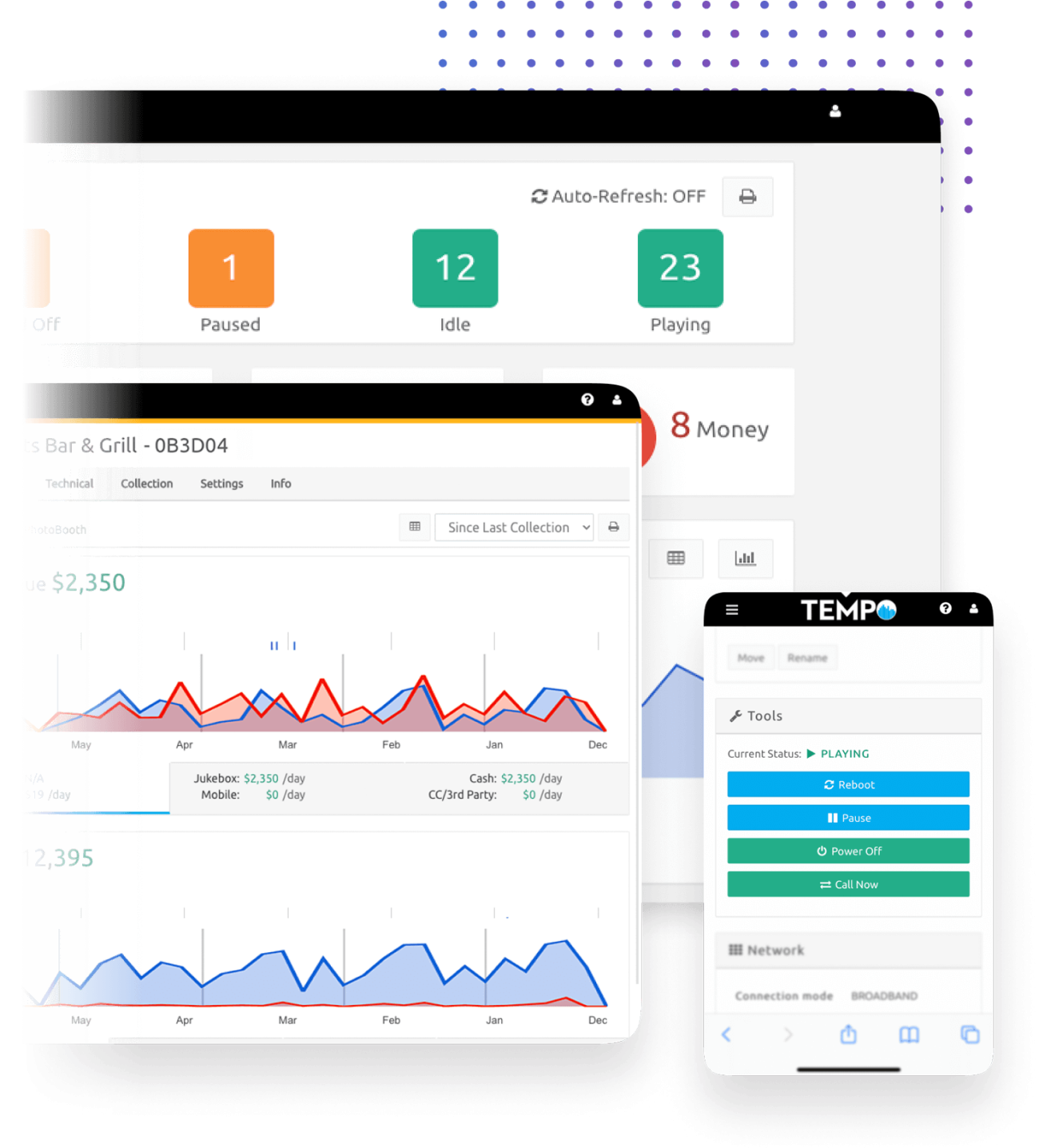
How does the legacy of innovation guide TouchTunes today?
Front of mind is continually asking how we can create a great consumer experience that drives business for everybody. From launching the app, going mobile, creating FastPass, creating Virtuo and building Angelina, everything is focused on moving in that direction. We’re working hard to add to the list of advancements and I’m excited about what’s coming in the coming months and years.
Innovation was fundamental to our founding, our success to date and how we will grow going forward. We continuously look at ways to get more people playing more music in more locations. That’s how we define success. We’re asking what we can do that’s new and innovative around our products and marketing, and how we work with operators to drive that.
And for the past 25 years, we’ve been doing that. We have the jukeboxes, the mobile app and Tempo, the backend that helps operators manage their portion of our network, and continue to evolve all those offerings, improving and enhancing them and making sure they’re available. As you know, the supply chain was very challenging in the last few years and our team had to work nonstop to source parts that were no longer available to try and keep the boxes coming in.
One of our core values is “we lead the way,” something we took from Nike. I’m very optimistic that we’re going to drive a very material level of innovation in creating more value for operators, venues and consumers going forward. We are working and investing in creating great new products and experiences and while I largely have to say, “stay tuned on that,” we’re excited.
What about expanding the types of locations for TouchTunes jukeboxes?
I see two types of opportunities. One is working with regional and national chains, generally casual dining restaurants to deploy jukeboxes as their music solution in their locations, either for the entire restaurant or just for the designated bar area. We’ve had great success with Waffle House, Buffalo Wild Wings, Hooters and Applebee’s, to name a few. We are actively talking to additional chains about working together and see a lot of opportunities. I think you’ll see more and more TouchTunes jukeboxes around.
The next opportunity is what we call “TouchTunes Unlimited,” designed for locations where creating the shared music experience the jukebox can facilitate has value. These locations include places like workplaces, hospitality like cruise ships and retail, where the traditional pay-per-play doesn’t make sense.
For example, asking your employees to purchase credits to listen to music in the workplace wouldn’t make sense. So, we charge the location a monthly fee that enables unlimited plays. While this amounts to hundreds of locations compared to our tens of thousands for coin-op, it’s been amazing to see how much people love it. We have a broad range of companies on board, from internet technology businesses that have them in their offices to the break room of a chicken food processing plant, from the distribution centers of major national shipping companies to a roof supply chain.
What’s also exciting is that this feeds back into coin-op. People who have never used a jukebox or TouchTunes before use the mobile app for free at work and then when they go out, it’s like, “Oh, there’s the jukebox! I love that!” and they go play a song.
The resulting data shows that a percentage of our consumers are new to TouchTunes and are spending in a way they didn’t before. It’s a win for everyone as we drive more awareness of TouchTunes by making it available in non-traditional locations.
What is the latest on TouchTunes’ ownership and team?
In April 2022, we were purchased by TA Associates, a leading global private equity firm that has a fantastic track record of investing in and growing companies. We’re very excited to partner with them to continue to invest in and drive more innovation to create more value for our business partners and consumers. That’s an important part of our story today.
We couldn’t do what we do without a fantastic group of people. Leading the way is an executive team that’s a great combination of veterans and recent additions who are bringing new thoughts and perspectives. So, within our veterans is Jamie Sura, our senior VP of sales; CFO Advait Kotecha; Dan Hamrick, our executive VP of business operations; and chief technology officer Quentin Gallet. They’re wonderful partners.
I’m very excited about new additions to the team. Leanna Bautista, joined us in January of this year as our chief people officer and is responsible for all HR functions. Brian Gottesman, came aboard a month ago as our chief product officer in charge of the design and experience of our products. And, chief marketing officer Amy Pascal, joined us last November.
Broadly, we have about 50 people in various roles supporting our 2,500 operator partners ranging from field salespeople to customer support. They certainly focus on selling the jukeboxes but also on working with operators to drive more location growth. How we find, identify and sell into new locations is an important focus for us.
What’s also wonderful about our sales team is that a number of them have been with the company for the full 25 years and can provide that longer-term perspective on the business: Nikki Hendricks, our senior director of national account sales; Chuck West, a growth executive out in the field working with operators; Rick Hirschman, director of field training and support; and Jon Bird, director of technical services for national accounts.
Where do you see TouchTunes in the next five years?
It’s really having a lot more people playing a lot more music in a lot more locations. We want to engage with younger consumers in particular. In our research, we find that Millennials and Gen Z are just not as familiar with the jukebox – they didn’t grow up with it the way older consumers did. We are developing marketing to increase awareness and evolving our product to engage them in ways they want to be while also keeping our existing customers happy. We will be launching an entirely new app sometime in the future with a key goal of attracting younger consumers and providing a better product for our existing customers as well.
We also plan to have at least one new jukebox over that time frame to help grow our operators’ businesses, particularly with the focus on new locations. A key question we’re focused on answering is what kind of jukebox do we need to build that will get into locations that currently don’t have one? We’re also going be a lot more active in our marketing, telling people about TouchTunes and the amazing experience that is the digital jukebox.
What are your personal goals?
First and foremost, my objective is to create the best possible team, one that is customer focused, works really well together and is great at what they do. My number one job is to ensure we have the right people in place. Then, it’s to work with them and alongside our customers to decide where we want to go and how we want to continue to innovate and grow the business.
Everything that happens here is a team effort. I’m most proud of what we’ve done over the last seven years to make TouchTunes a mobile-first business where the vast majority of our plays and revenues come from people using our app. It’s also growing operator revenue significantly alongside overall growth of the business. Our operators are making more money on jukeboxes than seven years ago.
Another highlight is launching Angelina and providing what we believe to be the best user experience in the market and were very deliberate about designing it to be easy for operators to service.
Is there anything else you want to add?
I want thank everyone, beginning with the founders of TouchTunes. We are only here because of their insight and innovation. This business is what it is today because of the many people who have worked here over the last 25 years and their accomplishments. Also, we wouldn’t exist without the artists who create the amazing music that plays on our jukeboxes. And, I am very thankful for the operators who have worked so hard with us to build and maintain the network we have today. They have been our trusted partners and I’m deeply grateful to them.
